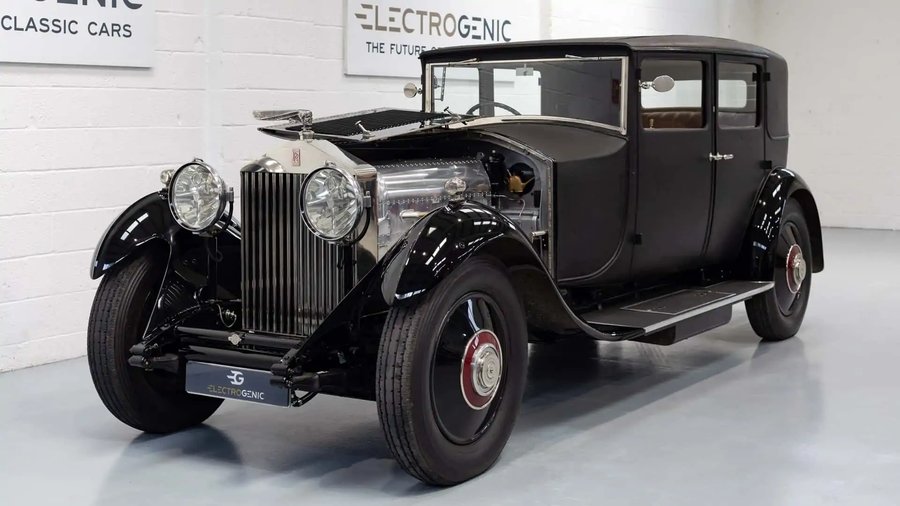1929 Rolls-Royce Phantom II EV Conversion By Electrogenic Revealed With 201 HP

A prewar 1929 Rolls-Royce Phantom II with an electric twist is set to take the stage at this year’s Salon Privé Concours d’Elegance in the United Kingdom, courtesy of the EV conversion specialists at Electrogenic.
When it originally hit the market in the 1920, the Phantom II was one of the most luxurious cars in the world, powered by a massive 7.7-liter straight-six engine that made modest 40 to 50 horsepower, sent to the rear wheels via a four-speed, non-synchromesh four-speed manual transmission.
Now, in this one-off conversion designed and engineered by Oxford-based Electrogenic for a private collector with a passion for the environment, the stately classic Rolls-Royce features a 93-kilowatt-hour battery pack, a part of which is housed under a hand-shaped and hand-riveted aluminum cowling under the hood, where the original engine used to reside. The other part of the battery pack is located between the chassis rails, resulting in a real-world driving range of 150 miles, according to the British company.
The 150-kilowatt (201-hp) electric motor is also nestled between the chassis rails and delivers 228 pound-feet (310 Newton-meters) of torque to a fixed reduction gear which in turn sends 737 lb ft (1,000 Nm) to the prop shaft.
Several challenges were encountered during the conversion process, Electrogenic says, including preserving the Rolls’ so-called “through-flow” chassis lubrication system, which is crucial to the Phantom II’s silky smooth drive, as well as redesigning the car’s cable-operated braking system, both of which weren’t made with an electric powertrain in mind almost 100 years ago.
The chassis lubrication setup sends oil to the car’s multiple phosphor-bronze bushes that make up the brake and suspension linkages, and the removal of the original straight-six lump rendered the system inoperable. However, the conversion specialist came up with a solution that ensures it continues to work as intended.
As for the braking system, the original brake pedal and levers were located under the bulkhead, in the space that’s now occupied by the large battery pack, so that needed to change. Electrogenic repositioned the levers and cables, retrofitted a hydraulic booster between the newly designed brake pedal and the original cable actuators, and as a modern finishing touch, it calibrated the revised system to work in tandem with the electric motor’s regen function.
The modernized Rolls-Royce also has three driving modes: a normal “Drive,” a range-boosting “Eco,” and a high-performance “Sport” setting, as well as a “regen doubler” mode for the regenerative braking that can be deployed by the driver on long, steep descents.
Furthermore, the interior got a discreet overhaul, with the original controls being repurposed and the original controls reworked. More specifically, the fuel gauge, which was originally a vertical sight glass, is now an LED gauge that shows the battery’s state of charge, the old amp meter is a power gauge that shows the rate of power draw when accelerating and power recuperation under regen, the oil temperature gauge shows charger temperature, and the water temperature gauge shows the temperature of the electric motor.
The cabin also features a state-of-the-art audio system with an integrated subwoofer under the rear seat and full Bluetooth connectivity, all while being hidden from view.
“This is undoubtedly the most complex classic car EV conversion yet attempted, the stunning results really are a testament to the world-leading talents of our team,” said Steve Drummond, Director at Electrogenic. “We’re immensely proud of the results, and we’re delighted to be unveiling it at Salon Privé, here at Blenheim Palace. It’s the perfect place to reveal such a stately piece of British motoring history, now updated and future-proofed for the next hundred years of clean, silent electric motoring.”
The project was completed in 18 months and is now part of the company’s expanding EV conversion portfolio that includes drop-in kits for cars like the Porsche 911, original Mini, and Jaguar E-Type, as well as bespoke creations such as a Porsche 356C, Citroen DS, and Land Rover Defender.


Related News
